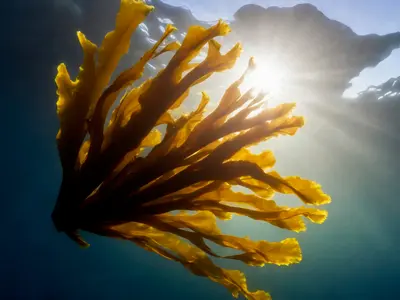
Key National and International Networks and Projects
The Roscoff Biological Station (SBR) is a leading center for marine science, recognized internationally for its integration into European research networks, participation in large-scale collaborative projects, and partnerships with top research institutes. Its research focuses on three emblematic areas:
- Macroalgae and their microbiomes – from fundamental biology and ecology to applied research, supported by advanced R&D infrastructures.
- Marine plankton diversity and ecology.
- Enhanced observatories of marine biodiversity.
International Engagement
Participation in European research networks and infrastructures
- EMBRC-ERIC: This European infrastructure brings together 45 marine stations across 9 countries, providing academic researchers and companies with access to resources and facilities to study marine ecosystems and develop innovative solutions to societal challenges. The Roscoff Biological Station is part of EMBRC France, the French component of the infrastructure. Recognized as a biodiversity hotspot with state-of-the-art scientific equipment, the Station offers access to the marine ecosystems of the English Channel and provides a range of services and expertise through its specialized technological platforms for the study of marine organisms and environments.
- EMO-BON – European Marine Omics Biodiversity Observation Network: EMO-BON is a European initiative of the European Marine Biological Resource Centre (EMBRC) aiming to establish a coordinated, long-term biodiversity observatory.
- ELIXIR: ELIXIR-FR ensures the sustainability of national bioinformatics resources, contributes to the development of a durable infrastructure for the storage, processing, and analysis of life science data, and provides access to tools and training to facilitate these activities. The Station is involved in ELIXIR through its bioinformatics platform (ABIMS).
Involvement in major European projects
- TREC Project (EMBL, Tara Oceans, EMBRC): This large-scale European program aims to study coastal biodiversity and the impacts of climate change and human activities. Conducted in partnership with the Tara Ocean Foundation and EMBRC, TREC involves sampling land-sea transects, sediments, and aerosols across over 100 sites, from the Baltic Sea to the Mediterranean. Drawing on its experience with Tara Oceans expeditions since 2009 and its involvement in EMBRC, the Roscoff Biological Station has been designated as one of the ten “super sites” of the TREC project. It supports the mission by providing its oceanographic vessel Neomysis, scientific divers, small boats, laboratories, and technological platforms integrated with EMBRC.
- BIOcean5D Project: This project brings together 31 research partners to explore marine biodiversity holistically, from molecular to organismal levels – from viruses to mammals – across space, time, and human scales. Researchers at the Roscoff Biological Station are involved in project coordination and actively participate in sampling, protocol development, and genetic and molecular analyses.
Collaborations
- Max Planck Institutes: Teams from the Roscoff Biological Station have collaborated with several Max Planck Institutes (MPI) for over 25 years. In 2022, partnerships were formalized around themes such as biotic interactions, evolution, ecology, diversity, and the development of new methods and models. These collaborations involve regular exchanges of early-career researchers.
Engagement with major societal challenges
- Global Seaweed Coalition: The Lloyd’s Register Foundation, in partnership with CNRS and UN Global Compact, launched a coalition to better support the industrial development of the seaweed sector, with research support. Since its inception, the Roscoff Biological Station has been actively involved in the coalition, contributing scientific expertise in macroalgae and coordinating the scientific aspects of the project.
National Initiatives
The Roscoff Biological Station has long been engaged in initiatives to federate and structure marine sciences at the national level. It is:
- A member of the French National Research Infrastructure in Biology and Health – EMBRC France. The Station initiated the creation of the National Marine Biological Resource Centre in 2010 and today forms one of the three pillars, alongside the Banyuls-sur-Mer and Villefranche-sur-Mer stations, of EMBRC France, providing access to resources and ecosystems for the international scientific community, both academic and private.
- A member of the French Institute of Bioinformatics through its ABIMS bioinformatics platform.
- A member of OSU STAMAR, which coordinates observation activities across the three Sorbonne University marine stations (Roscoff, Banyuls-sur-Mer, and Villefranche-sur-Mer).
- A member of the Sorbonne University Ocean Institute, which brings together leading French marine research actors and promotes an interdisciplinary approach to ocean knowledge, integrating natural sciences (physics, climatology, biology) and social sciences to address major global environmental challenges.
National Projects
Roscoff Biological Station scientists are heavily involved in leading national projects exploring marine biodiversity (microbes, viruses, microalgae, macroalgae, benthic species) to better understand ecosystem functioning in a changing global context.
- GEN4BIO (2022-2027): GEN4BIO will acquire equipment and develop genomic tools to observe biodiversity and support marine biotechnology development. It includes three projects:
- OGEBIOM: Genomic observatory of marine biodiversity.
- PHENOMALG: Phenotyping and conservation center for macroalgae genetic resources (EMBRC France).
- PHYCOTRON: Design and installation of experimental macroalgae cultures of economic and ecological interest.
- ATLASEA (2022-2029): “Atlas of marine genomes: from massive data to innovation”. Roscoff scientists are strongly involved in organizing two ATLASEA axes.
- AO EMBRC (2022-2027): “Augmented Observatories of the National Marine Biological Resource Centre (EMBRC-France)”. Building on Tara Oceans expeditions, this project integrates the latest tools and approaches into existing long-term monitoring programs to create Augmented Observatories (AOs) with enhanced functionalities. Roscoff scientists co-lead three work packages: biological sample archiving; instrumentation and environmental genomics methods; primary data storage and analysis.
- PIA3 Mudi4LS (2022-2027): “The shared digital space project for life sciences”. Roscoff scientists (ABIMS platform) co-lead WP1, “Orchestration of data flows for life sciences”, and lead the marine biology data integration and dissemination use case.
- FUTUR-Obs (2022-2028): “Augmented observatory for coastal socio-ecosystems”. FUTUR-Obs is funded by the French Government’s Ocean and Climate Priority Research Program and coordinated by OSU STAMAR.
Contact(s)
- Gavin FoxInternational Relations








